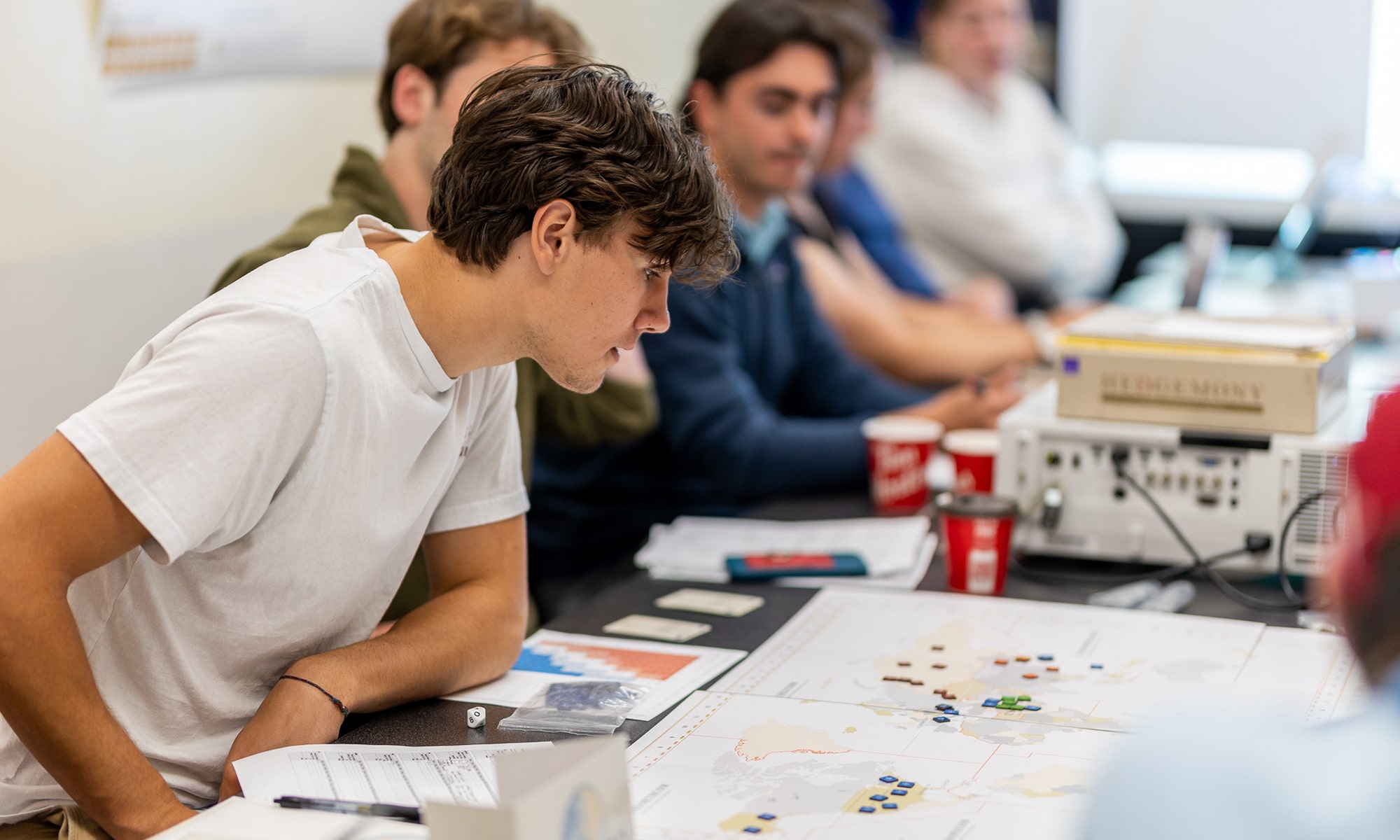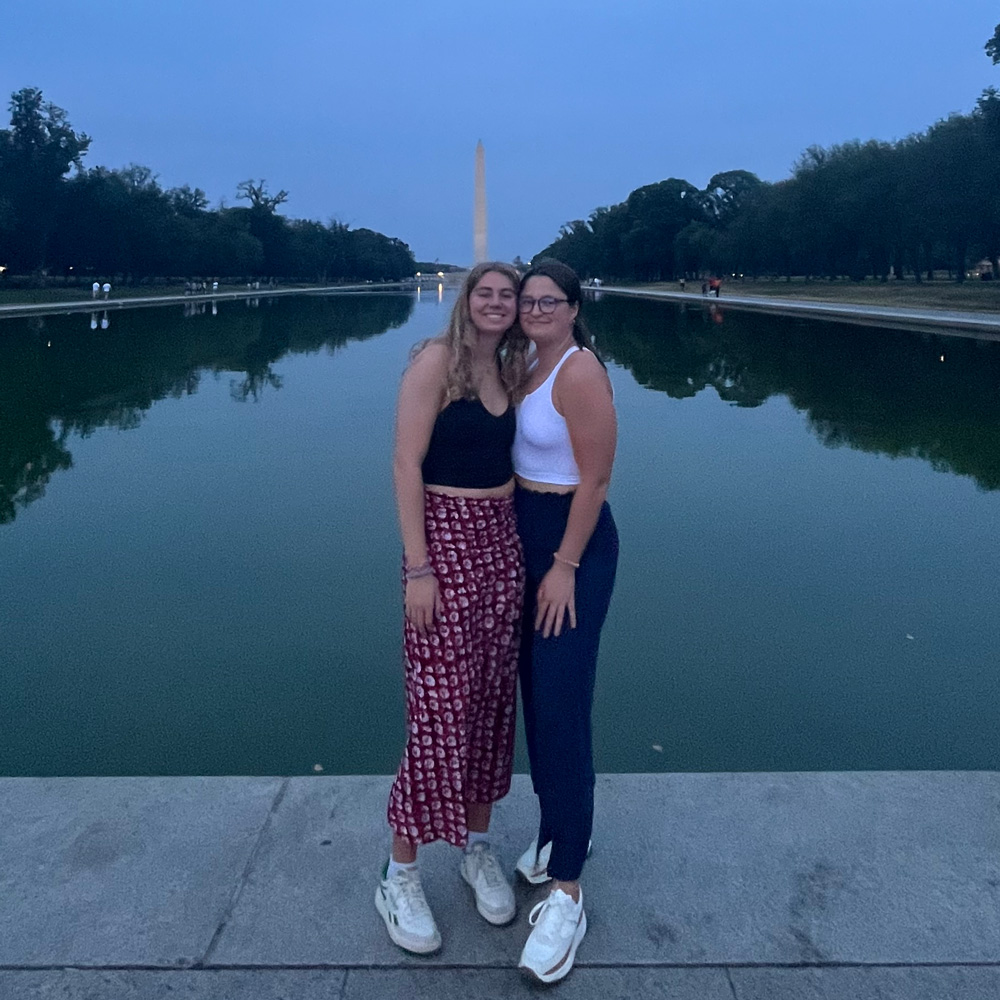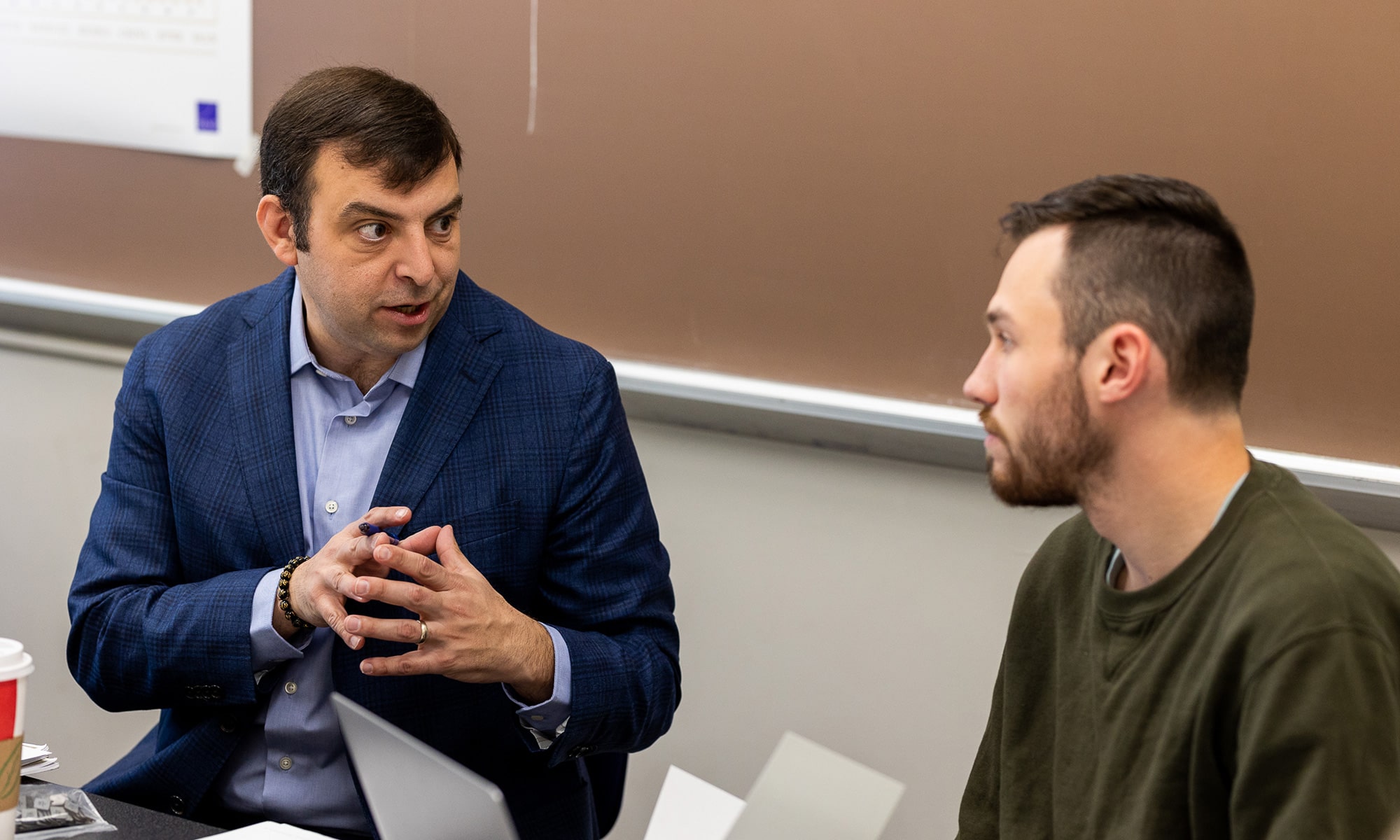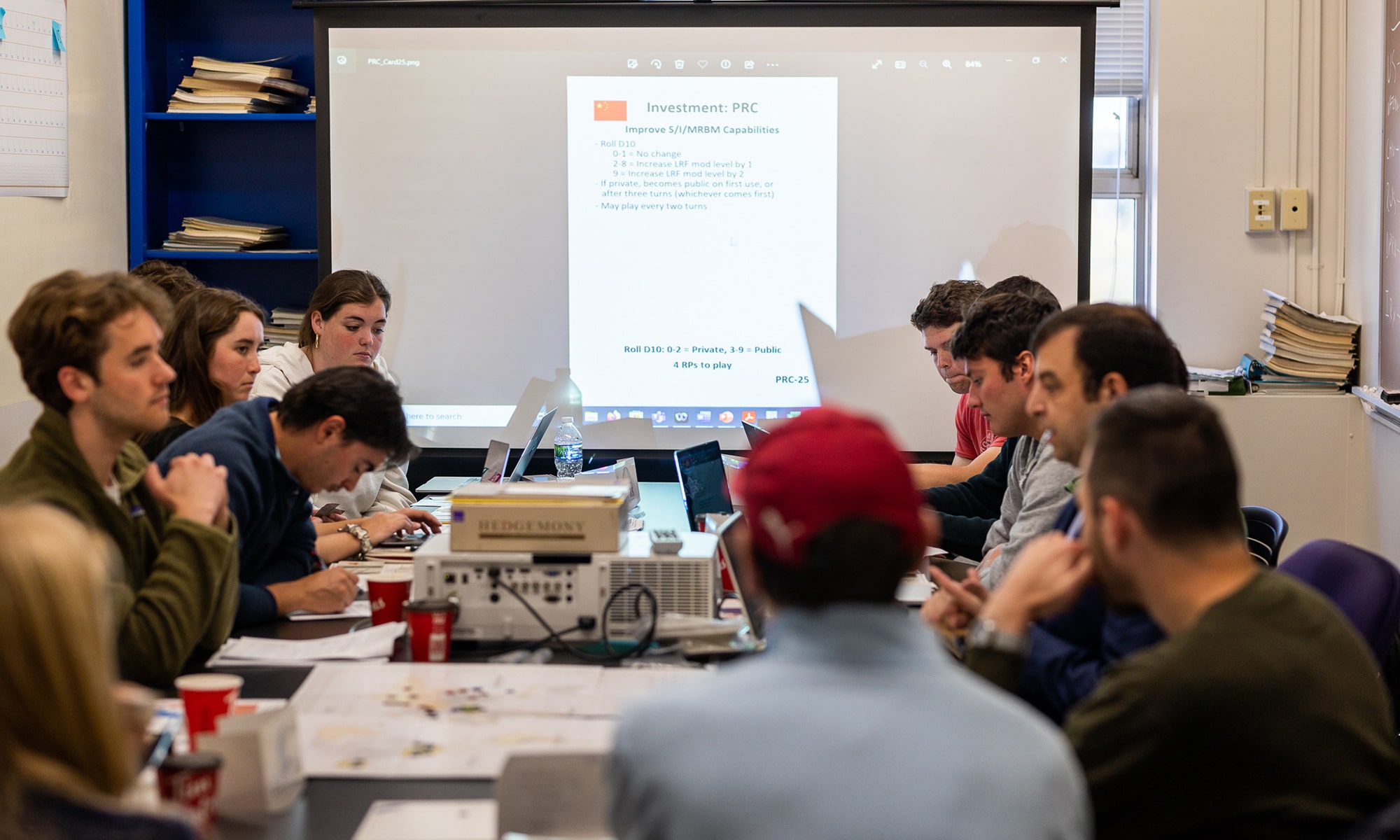In his former career as a U.S. Army officer and military strategist, Scott Smitson routinely wrestled with complicated, intractable issues — the sort of problems appropriately called “wicked.” He relished the opportunities that came hand-in-hand with the challenges.
Smitson’s strategy experiences ranged from working in the Pentagon in the Joint Staff, advising the head of the Counter-ISIS coalition in the Middle East, overseeing U.S. defense strategy and policy for Latin America for U.S. Southern Command, and serving as a professor at West Point.
Today, he teaches Denison students the theory and practice of strategy to prepare them for an increasingly dynamic and challenging world. It’s a unique and enlightening experience for a liberal arts student to learn from an academic with a full military career behind them.
Smitson calls it “scholarship with impact.”
The way of thinking and problem-solving Smitson imparts is part textbook, part experiential learning, part real-world application, and far too extensive for just one class. He has created a three-part program on Grand Strategy for his students to gain the knowledge, tools, and experiences needed to perfect a pragmatic approach to problem-solving.
First: Assemble your strategy toolbox
Smitson introduces students to the theoretical and practical components of strategy formulation and assessment in his course on national security policy and decision-making. Students are immersed in the important dimensions of how governments translate strategic objectives into actionable plans: institutions, frameworks, budgeting, and processes.
He adds context (and a bit of intrigue) with personal stories about the Pentagon from his time on the Joint Staff.
Philosophy, politics, and economics major Noah Lieb ’24 relished Smitson’s boots-on-the-ground knowledge. “You can google the U.S. government, but you don’t get the real complexities of how this stuff actually works,” Lieb said. “Learning from someone who practiced security policy is very cool.”
Students track resources and play out scenarios during a game of Hedgemony. The game is used to help the Office of the Security of Defense devise recent versions of the National Defense Strategy.
During the final weeks of the course, students play an epic tournament of Hedgemony. It’s more than a game — U.S. defense professionals use Hedgemony to test how their strategies might evolve in the field. The RAND Corporation created the game to help the Office of the Security of Defense devise recent versions of the National Defense Strategy (something Smitson contributed to during his stints at the Pentagon), and now it is used in the classroom.
Classmates play out simulations of actual events from the point of view of the United States, an international partner like the EU, or a competitor such as China, Russia, Iran, or North Korea. Complications arise. Situations spiral. It’s like overdosing on CNN. Each team had to make tough choices at the intersection of defense spending, political risk, economic investment, and diplomacy.
Lieb said you can also use the game to deconstruct recent historical scenarios, such as the 1982 suicide bombing at the barracks housing U.S. peacekeeping forces in Lebanon.
“We want to understand what went wrong,” he said. “Was it policy? Operations? Why was the intention good, but the outcome so bad?”
Next: Meet global leaders on their turf
Smitson wants his students to have the kind of knowledge they can only get from being where policy is made. The second element of the Grand Strategy program is taking his students on the road to meet government, policy, and military leaders.
Denison students visited the Washington Monument and Lincoln Memorial reflecting pool during their 10-day trip to Washington, D.C.
In the summer of 2023, Smitson brought his class to Washington, D.C., on a 10-day professional excursion.
“I want my students to understand the foundations of how security policy, broadly conceived, is shaped, made, and influenced in Washington, and how these policies shape American responses,” he said.
Flexing his personal network, and with the significant support of many Washington-based Denison alums, Smitson introduced his students to many of the most important organizations, institutions, and personalities that shape and influence U.S. policy across Washington.
The hefty agenda included meetings at the U.S. Import-Export Bank, the State Department, and Congress. The trip was capped off by a visit to the Pentagon, where students met key members of the policy and plans communities. Politics and public affairs major Jack Helms ’26 tacked on some additional sight-seeing: a cyber security session at AT&T and a visit to the Atlantic Council, where he watched Sen. Bill Cassidy (La.) and Sen. Mike Bennet (Colo.) discuss Mexican and Central American trade policies.
“Seeing recent graduates who just entered the workforce helped me realize this is something I could do, too.”
Students watched as military, diplomatic, and topic experts collaborated to achieve their goals. They also were treated to impromptu career panels at the end of each meeting, many of which included Denison alumni.
“It was remarkable to learn how these experts negotiated their career paths,” Lieb said. “I could see they were real human beings. For a 20-year-old, that’s important.”
It was the first visit to Washington for Julia Azevedo ’25, a politics and public affairs major from Sao Paulo, Brazil. She was thrilled to visit the New America think tank and meet with young professionals. “Seeing recent graduates who just entered the workforce helped me realize this is something I could do, too,” she said.
The Grand Finale: Proof of concept
During Grand Strategy’s final segment, students take their accumulated knowledge and focus on a current-day challenge. The fall 2023 class zeroed in on climate security issues in Africa. With eight climate zones, 54 countries, and more than 3,000 languages, the continent is not an easy test case.
And that’s the point Smitson is making — nothing is easy.
With strong support from the U.S. Agency for International Development, the U.S. Institute of Peace, and U.S. Africa Command (AFRICOM), each student chose a country to study and quickly became an expert on that region’s food, water, economic, health, and energy security. They saw how these issues become entangled and how it can be difficult to address one challenge, such as energy, without adversely affecting another, such as economic security.
After they were specialists in their nation, Smitson’s students assembled in groups broadly linked by climate to create presentations that considered how governments could mitigate the risk of climate-driven instability.
As Lieb and his teammates identified the similarities and differences between their regions, they realized there were no simple answers. “Climate change affected them all,” he said. “We had to look at everything not as individual countries, but holistically.”
For the course’s final exam, Smitson invited a group of panelists to observe the presentations: Tegan Blaine, a director of the U.S. Institute of Peace; Sharon Burke, the founder of Ecospherics, a global environmental consultant group; Peter Cloutier, a foreign services diplomat with the U.S. Agency for International Development; and Colonel John Griswold, a strategy director for U.S. AFRICOM.
Burke complimented the students on their work. “Top level,” she said. “These presentations are right on the cutting edge of what’s being invented and incorporated in government and international organizations right now.”
Griswold was struck by the level of storytelling. “The ability to weave together a causal story that is thoughtful and informed is a gift,” he said. “It’s proof of the value of a liberal arts education — like systems integration on steroids.”
Students see the impact of policy sweep across the map as they test strategies during a Hedgemony tournament.
Smitson is already planning for the future. The next trip to Washington is being planned for a new cohort of students, and the fall 2024 course will be dedicated to understanding the geopolitics of energy. Career and professional development will be another plank of the program, and efforts are underway to align internship opportunities in the national security space with Grand Strategy program students.
“We must be prepared, taught, inspired, and mentored to see, to foresee, and hear and heed, the ‘warning shots’ that will herald not only the future challenges to the nation, but most importantly, those opportunities that come hand-in-hand with the challenges,” Smitson said, “Our study of Grand Strategy helps to build and grow within us that kind of confident foresight of thought for future action.”






